The Alaskan Malamute is a loyal and affectionate breed known for their strong work ethic and playful personality. Despite their size and power, Alaskan Malamutes are known for their gentle dispositions and love for human attention. This article will delve deeper into the Alaskan malamute temperament, exploring their personality traits and behaviors.
Alaskan Malamutes are friendly, loyal, and affectionate dogs. They are good with children and other pets. However, they can be independent and stubborn sometimes, so early socialization and obedience training are essential. They have a strong pack instinct and may display dominance over other dogs. They have high energy levels and require daily exercise.
Furthermore, Alaskan Malamutes are also known for being intelligent but can be challenging to train due to their stubborn nature. They are a working breed with a strong prey drive, so that they may chase small animals. They have a thick double coat and shed a lot, so regular grooming is necessary.
They are not suited for apartment living and do best in a large, securely fenced yard. They are not recommended for first-time dog owners due to their high energy and exercise needs and their independent nature.
Alaskan malamute temperament
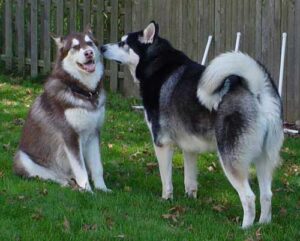
Alaskan Malamutes are friendly, loyal, and affectionate dogs that make excellent family pets. They have a strong pack mentality and bond well with their owners, especially when treated as a family member. These dogs are known for their playful and mischievous nature, which can make them entertaining companions for children.
Despite their friendly nature, Alaskan Malamutes can be pretty independent and may respond poorly to harsh training methods. They are intelligent dogs but may only sometimes be eager to please, requiring patience and persistence in training. These dogs have a strong prey drive, which can make them prone to chasing small animals, and they may also tend to dig, chew and bark.
Alaskan Malamutes were bred as sled dogs and had a strong work ethic and need for physical exercise. They require regular and vigorous exercise, such as long walks, runs, and play sessions, to keep them happy and healthy.
They also enjoy activities that allow them to use problem-solving skills, such as agility training. Without sufficient exercise, Alaskan Malamutes may become bored and destructive, so owners should be prepared to provide them with plenty of physical and mental stimulation.
What is the typical temperament of an Alaskan Malamute?
The typical temperament of an Alaskan Malamute is friendly, loyal, affectionate, playful, mischievous, independent, strong-willed, intelligent, with a strong prey drive, a strong work ethic, and a need for physical and mental stimulation. They bond well with their owners but can be prone to chasing small animals, digging, chewing, and barking.
They require patience and persistence in training and regular vigorous exercise to keep them happy and healthy.
In addition to their physical exercise needs, Alaskan Malamutes also benefit from mental stimulation and training. They are intelligent dogs enjoying activities challenging their minds, such as obedience and agility training. They are also known for their strong pack mentality and can protect their family.
Alaskan Malamutes are generally good with children but may only sometimes be compatible with other pets due to their strong prey drive.
Alaskan Malamute owners need to be assertive and confident in their leadership role, as these dogs can be challenging to train and tend to become dominant if not correctly managed.
Also, they have a thick double coat that requires regular grooming to keep them looking and feeling their best. With proper care, training, and attention, Alaskan Malamutes can be loving and loyal companions for years to come.
How does an Alaskan Malamute’s temperament compare to other breeds?
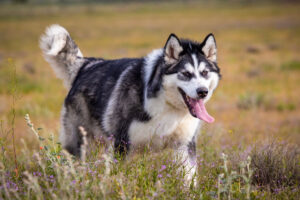
Compared to other breeds, Alaskan Malamutes have a unique temperament that sets them apart. They are friendly and affectionate with their owners but can be independent and strong-willed, which sets them apart from breeds like Labrador Retrievers or Golden Retrievers, who are known for their eagerness to please.
However, their playful and mischievous nature is similar to breeds like Siberian Huskies. Still, Alaskan Malamutes have a stronger prey drive and work ethic, making them better suited for more experienced dog owners.
Their need for physical and mental stimulation is also higher than some other breeds, making them less suitable for apartment living or sedentary lifestyles.
Overall, Alaskan Malamutes are intelligent, loyal, and loving dogs that thrive in homes with owners who can provide them with plenty of exercise, training, and attention. However, some may have better choices, and potential owners should research the breed thoroughly to determine if it is a good fit for their lifestyle.
Are Alaskan Malamutes good family pets?
Alaskan Malamutes can be good family pets. They are known for their friendly, loyal, and affectionate nature and bond well with their owners, especially when treated as a family member. They also have a playful and mischievous personalities that can make them entertaining companions for children.
However, they have high exercise and mental stimulation needs and can be challenging to train. As a result, they may not be the best choice for families with very young children or those unable to provide them with the physical and mental stimulation they require.
Finally, with proper training, socialization, and attention, Alaskan Malamutes can make wonderful family pets for those who are prepared to meet their needs.
Are Alaskan Malamutes good with children?
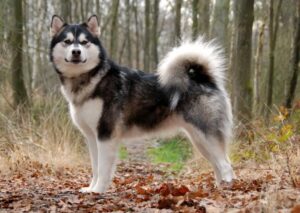
Alaskan Malamutes can be good with children. They are friendly, playful, and affectionate, making them great companions for kids. They are also known for their patience and gentle nature and are generally good-natured and tolerant of children.
Moreover, it’s important to supervise all interactions between dogs and children to ensure their safety. Children should also be taught how to interact appropriately with dogs to prevent accidental injuries.
Additionally, Alaskan Malamutes have high exercise needs, so families with young children may need to be prepared to provide them with regular, vigorous exercise and mental stimulation.
How does an Alaskan Malamute’s temperament change as it ages?
As an Alaskan Malamute ages, their temperament may change slightly, but their overall friendly and affectionate nature typically remains the same. They may become more relaxed and easier to train as they mature, but may also become more set in their ways and less receptive to new experiences or training.
It’s also common for older Alaskan Malamutes to have a decrease in energy levels and a reduction in their exercise needs. However, they still require regular exercise and mental stimulation to keep them happy and healthy.
Health issues that can occur with age, such as arthritis or vision loss, can also impact an Alaskan Malamute’s temperament.
Owners should be prepared to make any necessary adjustments to accommodate their changing needs, such as providing a comfortable bed, offering joint supplements, or modifying their living space to help with mobility issues. With proper care and attention, Alaskan Malamutes can remain happy and loving companions well into their senior years.
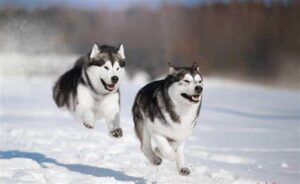
The temperament of an Alaskan Malamute can be significantly affected by training and socialization. Proper training and socialization can help to prevent behavioral issues, such as aggression, destructive behavior, and excessive barking. They can also help to develop a well-behaved, well-adjusted, and confident dog.
Socialization can help an Alaskan Malamute to become more comfortable in different environments and with new people, animals, and experiences.
Training is crucial for Alaskan Malamutes, as they can be challenging due to their independent and strong-willed nature. Consistent, positive reinforcement training methods and early socialization can help to prevent behavioral issues and encourage good behavior.
It’s also essential for owners to establish themselves as confident and assertive leaders to prevent any tendency towards dominance or separation anxiety.
How does an Alaskan Malamute’s temperament compare to a Siberian Husky?
The Alaskan Malamute and Siberian Husky are similar in many ways but have distinct differences in temperament. Both breeds are friendly, playful, and affectionate with their owners and are known for their mischievous and charming personalities.
However, Alaskan Malamutes are often more independent and strong-willed than Siberian Huskies, making them more challenging to train. They also have a higher prey drive and a stronger work ethic, making them better suited for more experienced dog owners.
On the other hand, Siberian Huskies are known for their eagerness to please and high trainability. They also tend to be more vocal and have a higher tendency towards escape behaviors, such as digging and jumping over fences, than Alaskan Malamutes.
How does an Alaskan Malamute’s temperament compare to a Samoyed?
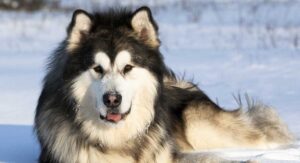
The Alaskan Malamute and Samoyed are both friendly and affectionate breeds but differ in their temperaments. Alaskan Malamutes are more independent and strong-willed and can be more challenging to train due to their stubborn nature. They are also more protective of their family and territory and have a higher prey drive than Samoyeds.
On the other hand, Samoyeds are known for their cheerful and gentle dispositions. They are generally more submissive and easier to train than Alaskan Malamutes, but they can be quite vocal and bark more frequently. They also have a stronger instinct to herd and may try to herd small children and other pets.
Both breeds are affectionate and loyal to their families and enjoy being a part of the household. They are both highly social and enjoy the company of people and other dogs. However, the Alaskan Malamute may be more suited for experienced dog owners.
At the same time, the Samoyed may be better for families with young children or those looking for a more easy-going and trainable dog.
Are Alaskan Malamutes good with other pets?
Alaskan Malamutes can coexist with other pets if properly socialized from an early age. However, their high prey drive and tendency to chase smaller animals may present challenges in households with cats or small animals. They may also be protective of their food and toys and display aggressive behavior towards other pets.
Supervising Alaskan Malamutes when interacting with other pets and providing proper training and socialization to help prevent any aggressive or territorial behavior is essential. Socializing Alaskan Malamutes with other pets at an early age can help build positive relationships and reduce the risk of any behavioral issues.
Are Alaskan Malamutes good guard dogs?
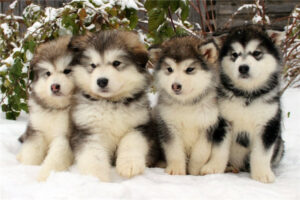
Alaskan Malamutes can be good guard dogs due to their protective nature and territorial instincts. They are highly aware of their surroundings and bark to alert their owners of any potential danger. Their large size and strength also make them intimidating to potential intruders.
However, Alaskan Malamutes are not naturally aggressive and need a strong instinct to attack. They may bark and be protective but are not typically trained to bite or attack. Training and socialization can encourage good behavior and prevent aggressive tendencies.
Finally, Alaskan Malamutes can make good guard dogs, but their effectiveness will depend on their temperament and training. Owners must provide proper training and socialization to encourage good behavior and supervise them when in protective mode to prevent accidents or incidents.
How does an Alaskan Malamute’s temperament change during different seasons?
It is not necessarily the case that an Alaskan Malamute’s temperament changes with the seasons. Temperament is determined by genetics, socialization, and training and is not typically affected by changes in weather or season.
However, like all dogs, Alaskan Malamutes may be affected by changes in their routine or environment, such as increased time indoors during winter, which can impact their behavior and energy levels.
Ensure you provide Alaskan Malamutes with daily exercise, mental stimulation, and socialization regardless of the season to maintain their overall well-being and prevent behavioral issues from arising.
Additionally, some Alaskan Malamutes may be more sensitive to extreme weather conditions, such as extreme heat or cold, and may require additional care and protection.
Are there any genetic factors that affect an Alaskan Malamute’s temperament?
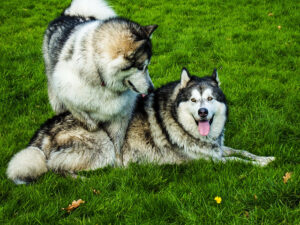
Genetics play a significant role in determining an Alaskan Malamute’s temperament. Temperament traits such as sociability, playfulness, trainability, and reactivity to stimuli are all influenced by an individual dog’s genetic makeup.
However, it is essential to note that genetics is just one factor influencing a dog’s temperament. How a dog is raised, socialized, and trained also plays a crucial role in shaping its behavior and personality.
Additionally, temperament can be influenced by the specific breeding line an Alaskan Malamute comes from and the individual personalities of its parents and other close relatives.
It is essential for breeders to consider temperament when selecting breeding pairs carefully and to provide puppies with appropriate socialization and training opportunities during their critical socialization period, which occurs during the first few months of life. This can help ensure that Alaskan Malamutes are well-adjusted, friendly, and able to adapt to various environments and situations.
How does an Alaskan Malamute’s temperament compare to other Spitz-type breeds?
Alaskan Malamutes are one of several Spitz-type breeds characterized by their thick, dense coats and instinctual, independent nature. Compared to other Spitz-type breeds, Alaskan Malamutes are known for being friendly, loyal, and affectionate with their family.
They are also known for being strong-willed and independent, sometimes making them difficult to train.
Compared to other Spitz-type breeds, Alaskan Malamutes tend to be less aggressive and more sociable. For example, Siberian Huskies, another popular Spitz-type breed, are often more independent and aloof and may be more prone to wandering and escaping than Alaskan Malamutes.
Remember that temperament can vary widely within a breed and between individual dogs. Proper socialization, training, and attention to the dog’s physical and mental needs are critical factors in promoting positive behavior and temperament.
Are Alaskan Malamutes known to have any behavior issues?
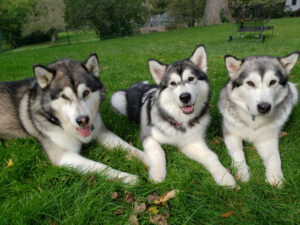
Like all breeds, Alaskan Malamutes can be prone to specific behavior issues. Some common problems that may arise in Alaskan Malamutes include:
Separation anxiety: Alaskan Malamutes form strong bonds with their owners and may experience distress when left alone for extended periods.
Destruction: Alaskan Malamutes have a lot of energy and may become destructive if they are not given enough exercise and mental stimulation.
Pulling on the leash: Alaskan Malamutes were bred to pull sleds and may have a strong urge to pull when walking on a leash.
Barking: Alaskan Malamutes may bark excessively if they are bored, anxious, or not given enough attention.
Dominance: Alaskan Malamutes can be strong-willed and may display dominant behaviors if they need to be adequately trained and socialized.
It is essential to address behavior issues early on through positive reinforcement training, socialization, and providing adequate exercise and mental stimulation.
Conclusion
Alaskan malamute temperament concludes that the Alaskan Malamute is a friendly and loyal breed that forms strong bonds with its family. Despite being known for their independent and strong-willed nature, Alaskan Malamutes can be well-behaved with proper socialization, training, and attention to their physical and mental needs.
However, like all breeds, Alaskan Malamutes can be prone to specific behavior issues, such as separation anxiety, destruction, pulling on the leash, barking, and dominance. With early intervention and appropriate training and care, these issues can be effectively managed, allowing Alaskan Malamutes to thrive as beloved family pets.
The Alaskan Malamute is a remarkable breed with a unique and charming temperament that is sure to capture the hearts of its owners.


